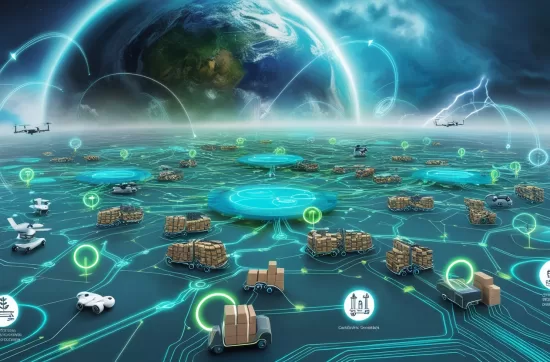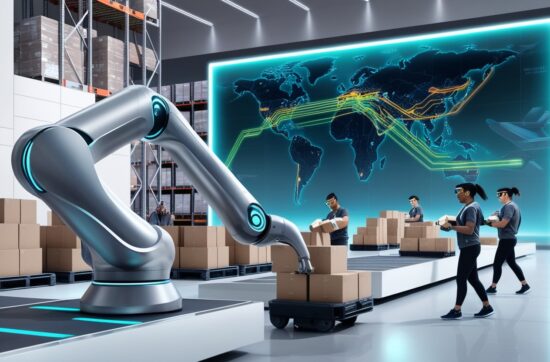Explore strategies to future-proof logistics against climate change, ensuring sustainability, efficiency, and resilience in your supply chain. Introduction:Climate Change and logistics are closely linked, as the logistics industry must adapt to new environmental challenges. As extreme weather patterns, rising sea levels, and resource scarcity become more common, Climate Change and Logistics companies face pressure to reduce their carbon footprint while maintaining efficiency Future-proofing logistics against climate change is essential for ensuring resilience and sustainability in supply chains. This blog explores actionable strategies to help climate change and logistics businesses not only mitigate their environmental impact but also thrive in an increasingly eco-conscious market. Understanding Climate Change’s Impact on Logistics Understanding Climate Change and Logistics: Key Impacts and solutionsstics Key Strategies for Future-Proofing Logistics Conclusion: Building a Resilient Future for Logistics As the effects of climate change become more pronounced, logistics companies must take proactive steps to future-proof their operations. By investing in sustainable technologies, enhancing supply chain visibility, and adopting green practices, businesses can not only reduce their environmental impact but also thrive in a changing market. Future-proofing logistics against climate change is not just a responsibility; it is a necessity for long-term success. By implementing the strategies discussed in this blog, logistics companies can build resilience, satisfy regulatory demands, and meet consumer expectations while contributing to a more sustainable future.
Posts TaggedSustainable Logistics Practices
Revolutionizing Logistics: The Transformative Power of Technology in Driving Innovation and Efficiency
In the ever-evolving landscape of logistics, technology stands as a pivotal force reshaping the industry. From automation and data analytics to advanced tracking systems and sustainable practices, technological advancements are not just enhancing operational efficiency but also driving innovation. Let’s explore how Technology in Logistics are revolutionizing logistics and paving the way for a smarter, more efficient future. 1. Automation: Streamlining Operations Revolutionizing logistics is reducing manual intervention and optimizing processes. Automated warehousing, powered by robotics and AI, enables faster and more accurate order processing. Automated guided vehicles (AGVs) and drones are transforming inventory management and last-mile delivery, ensuring timely and precise deliveries. 2. Big Data and Analytics: Enhancing Decision-Making Data analytics in logistics is a game-changer, providing valuable insights into operations and enabling data-driven decision-making. Revolutionizing logistics, by analyzing large volumes of data, logistics companies can forecast demand, optimize routes, and enhance customer service. 3. Internet of Things (IoT): Connecting the Supply Chain IoT in logistics technology connects various elements of the supply chain, providing real-time data and enhancing transparency. Revolutionizing logistics, sensors and smart devices enable real-time monitoring of goods, ensuring their safety and quality in the logistics industry. 4. Blockchain: Ensuring Transparency and Security Blockchain technology is transforming logistics by enhancing transparency, security, and traceability. Revolutionizing logistics, it provides a decentralized and immutable ledger of transactions, reducing fraud and improving trust among stakeholders. 5. Artificial Intelligence (AI): Optimizing Logistics Management AI is driving innovation in logistics by automating complex tasks, optimizing routes, and improving customer experiences. Revolutionizing logistics, machine learning algorithms analyze vast amounts of data to identify patterns and make informed decisions. 6. Sustainable Practices: Green Logistics Sustainability is becoming a key focus in logistics, driven by technological innovations. Revolutionizing logistics, adopting eco-friendly practices not only minimizes environmental impact but also boosts operational efficiency and reduces costs. 7. Augmented Reality (AR) and Virtual Reality (VR): Enhancing Training and Operations AR and VR technologies are enhancing logistics by improving training programs and operational efficiency. These technologies provide immersive experiences, enabling better understanding and execution of tasks. 8. 3D Printing: Revolutionizing Manufacturing and Logistics 3D printing is transforming the logistics landscape by enabling on-demand production and reducing inventory costs. This technology allows companies to produce parts and products closer to the point of consumption. Conclusion The integration of these advanced technologies is propelling the logistics industry towards a future of enhanced efficiency, transparency, and sustainability. By embracing automation, data analytics, IoT, blockchain, AI, and other innovative technologies, logistics companies can stay ahead of the curve, delivering superior services and driving industry-wide transformation.



